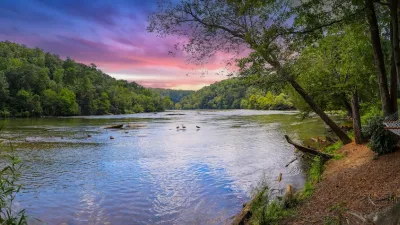The court set a standard of "reasonable anticipation" that improved cleaner technologies will be developed, allowing government agencies to set more stringent standards for that anticipated future.
The decision was a win for environmentalists, says Maura Dolan of the Los Angeles Times:
"The ruling came in a lawsuit brought by paint manufacturers against the South Coast Air Quality Management District, which regulates pollution from sources other than vehicles.
The American Coatings Assn. Inc., challenging standards that limited pollution-causing substances in paints and other coatings, contended that new rules should rely on the best available technology."
Loyola Law professor Daniel P. Selmi told the L.A. Times:
"The district's mandate is to obtain health-based air quality standards, and it can't do that unless it is able to adopt rules that force the development of technology," Selmi said.
FULL STORY: Pollution Controls Can Be Based on Nonexistent Technologies, Rules California Court

Study: Maui’s Plan to Convert Vacation Rentals to Long-Term Housing Could Cause Nearly $1 Billion Economic Loss
The plan would reduce visitor accommodation by 25,% resulting in 1,900 jobs lost.

Alabama: Trump Terminates Settlements for Black Communities Harmed By Raw Sewage
Trump deemed the landmark civil rights agreement “illegal DEI and environmental justice policy.”

North Texas Transit Leaders Tout Benefits of TOD for Growing Region
At a summit focused on transit-oriented development, policymakers discussed how North Texas’ expanded light rail system can serve as a tool for economic growth.

Virginia Law Allows Judges to Mandate Speed Limiters
The law could set a new precedent for speed limiting tech on U.S. vehicles.

Comment: EPA Cuts will Send Atlanta Back to Eye-burning Ozone, Lung-damaging Smog, and Raw Sewage in the Chattahoochee River
A veteran political journalist takes stock of the hard-earned ground Georgia stands to lose with slashed environmental protection.

How Community Science Connects People, Parks, and Biodiversity
Community science engages people of all backgrounds in documenting local biodiversity, strengthening connections to nature, and contributing to global efforts like the City Nature Challenge to build a more inclusive and resilient future.
Urban Design for Planners 1: Software Tools
This six-course series explores essential urban design concepts using open source software and equips planners with the tools they need to participate fully in the urban design process.
Planning for Universal Design
Learn the tools for implementing Universal Design in planning regulations.
City of Santa Clarita
Ascent Environmental
Institute for Housing and Urban Development Studies (IHS)
City of Grandview
Harvard GSD Executive Education
Toledo-Lucas County Plan Commissions
Salt Lake City
NYU Wagner Graduate School of Public Service





























